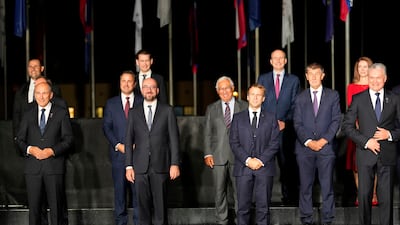A summit of EU leaders on Tuesday exposed divisions over how far Europe should seek military independence from Washington, after France was enraged by seeing a submarine contract bulldozed by the US.
France’s humiliation after it was left out in the cold by the Aukus pact, an alliance between the UK, US and Australia, came with calls for EU autonomy already growing louder after the messy withdrawal from Afghanistan.
But some countries in Central and Eastern Europe are concerned a European army would weaken Nato, which they regard as their key line of defence against Russia.
The EU has a reserve of “battle groups” that have been on standby since 2007 but never used. Brussels suggests replacing them with a rapid response force, which could carry out operations such as the evacuation from Kabul.
The summit in Slovenia ended without concrete conclusions as the EU prepares to present a new strategic blueprint next month.
French President Emmanuel Macron used the dinner to call on EU leaders to be “clear with ourselves about what we want”.
“On the technological and industrial, economic, financial, but also military levels, we must build the terms of a stronger Europe,” he said.
“You know that this is what I deeply believe. A Europe that can take its share of responsibilities for itself and which can choose its partners, while working closely with its historical allies.”
Charles Michel, the president of the European Council, joined Mr Macron in making the case for EU autonomy. “To become more effective and assertive on the international stage, the European Union needs to increase its capacity to act autonomously,” he said.
“We are committed to consolidating our strengths and strengthening our resilience by reducing our critical dependencies.”

The EU’s executive arm did not present a concrete proposal at the summit, which came ahead of talks on EU enlargement to the Balkans on Wednesday.
Dutch Prime Minister Mark Rutte said the meeting had been a useful “brainstorming debate” but acknowledged different attitudes within Europe.
“Some member states will put more emphasis on the European side, our collective defence, whilst others will put more emphasis on the need for a strong transatlantic relationship,” he said.
“But we all agree that both elements have to be in.”
Russian threat
The US alliance is regarded as critical to countering the threat of Russia. Nato’s relations with Moscow were described at a June summit as being at their lowest point since the end of the Cold War.
Krisjanis Karins, the prime minister of Latvia, was among those to stress transatlantic ties at Tuesday’s summit.
“It’s a good idea to speak about how, in Europe, we can make ourselves stronger. That is not, I think, a problem,” he said.
“The question is – how do we make ourselves stronger within the alliances that we have? The EU-Nato alliance, the transatlantic alliance is a very important aspect that should not in any way be compromised.”
The president of Lithuania, Gitanas Nauseda, made his point in an early-morning tweet decorated with EU and US flags.
“The US is a key partner of the EU,” he said. “We share same values and long history. The EU and US need to work together on strengthening the transatlantic bond.”
Joe Biden’s election as US president raised hopes for a renewal of Nato ties after the stormy Donald Trump years.
But the alliance faced questions over its future after the US withdrawal from Afghanistan effectively tied the hands of Washington’s European allies.
Speaking on Wednesday, Nato Secretary-General Jens Stoltenberg came to the organisation's defence and said the fallout from Afghanistan should not weaken transatlantic ties.
"The crisis in Afghanistan does not change the need for North America and Europe to stand together in a more dangerous and competitive world," he told a German panel reviewing the mission in Afghanistan.
"Russia’s aggressive actions, the continued threat of terrorism, China flexing its economic and military muscles, sophisticated cyber-attacks, the proliferation of nuclear weapons and the security impact of climate change – these are challenges that no country and no continent can face alone."
While arguments were still raging over Afghanistan, ties were frayed further when the US, UK and Australia announced their deal to build submarines, tearing up a deal for France to provide the vessels.
It left France sidelined in the Indo-Pacific after it had sought to position itself as a key strategic player in the region.
Paris and Washington have since sought to repair ties. Mr Macron spoke to US Secretary of State Antony Blinken on Tuesday.
The Elysee Palace said Mr Blinken's visit would contribute to "restoring confidence" between the sides.


